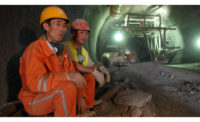The global boycott, divestment and sanctions (BDS) campaign against Israel—which, because of the Jewish state's Palestinian policies, attempts to "black list" Israeli companies and universities, as well as foreign companies that do business with the country—has been considered a fringe movement of religious groups and campus activists.
But its impact in the construction sector in Israel and globally has ramped up in recent weeks.
BDS proponents claim the campaign won a victory in January by forcing Ireland-based CRH Group, one of the world's largest building products conglomerates, to sell its 25% stake in Nesher Cement, Israel's largest cement firm. CRH, with recent global revenue of about $19.2 billion, acquired its interest in the Israeli firm for $141 million in 2001.
Pro-Palestinian groups had targeted the Irish company in recent months, arguing that Nesher supplied materials for Israel’s separation fence as well as for Jewish settlements in the West Bank.
The Irish company denied that the move was politically motivated, citing the sale of stakes in 13 companies in 2015. It has been concerned about regulatory reform of the Israel cement market, which could threaten its position, says Israeli business journal Globes.
In addition, last month, the pension fund of the 7-million-member United Methodist Church added five Israeli banks and its largest construction company, Shikun U’Binui, to a list of 39 companies that it will not invest in due to what it termed human rights violations. The fund has more than $20 billion in assets.
Those actions follow petitions signed by several hundred academics and researchers in Italy in late January, and in the U.K. last year, to sever ties with the Technion, Israel's leading science and engineering university, and other institutions based on their work for the country's military.
Student councils at University of California campuses also have targeted the school's investments in companies doing work in Israeli-occupied areas such as the West Bank. These include equipment giant Caterpillar. Israeli sources said that so far, Caterpillar’s operations in Israel have not been impacted. Students at other campuses, including University of Washington and Canada's McGill University, have pushed similar protests.
The actions follow the sale last summer by France’s Veolia Environment of its operations in Israel, which included stakes in a large desalination plant, a private power plant, Jerusalem’s light rail system and sewage treatment facilities.
Veolia also was the target of intense pressure by pro-Palestinian groups to sell its Israeli venture, but the firm also denied that BDS played a part in its decision. An executive told Newsweek that the exit was a "business decision" not influenced by outside pressure.
Norway’s huge sovereign wealth fund announced in 2014 that it would not invest in Israeli developer Africa Israel Investments and its construction arm Danya Cebus because of their involvement in construction in the West Bank.
Also in 2014, Vitens, the Netherlands' largest drinking water company, and design firm Royal Haskoning/DHV cancelled plans to participate in Israeli water projects citing that they were in the occupied West Bank.
At the time the Dutch foreign ministry said it discouraged companies from economic involvement beyond Israel’s pre-1967 borders. In the same year several European firms dropped out of the tender to build two new ports at Ashdod in southern Israel and in Haifa.
The Ashdod port project was awarded to China Harbor Engineering Co. and the Haifa project went to Israel’s Ashtrom-Shapir consortium.
“Western European companies are definitely far more susceptible to pro-Palestinian pressure than those in the Far East or the U.S.” said Nitzana Darsan Leitner, a lawyer and director of Yesh Din, a Tel Aviv-based NGO that is active in the fight against BDS.
She added that despite their denials it is difficult to ascertain whether the BDS campaign had an impact on the decisions of companies such as CRH and Veolia.
But other companies, including Germany’s Heidelberg Cement, through its acquisition of Britain’s Hanson and Mexico’s Cemex, have continued their operations in Israel.
“We haven’t seen any substantial reduction in the number of foreign companies bidding on major tenders for projects like the Tel Aviv light rail or the Israel Railways expansion and electrification,” said a senior engineer at one of the country’s largest engineering firms.
Any tangible decline in European interest in local infrastructure projects is likely to be met by an upsurge in Chinese and Far East participation, industry observers say. China has already become a major force in infrastructure projects in Israel’s transport sector including winning major contracts on the Carmel tunnels, the Acco-Carmiel train line, as well as the Ashdod port.
An Israeli construction industry source said that so far Israeli construction and engineering companies working abroad have not been affected by BDS-targeted sanctions. He attributed this to their focus on markets in Africa and other developing areas, where BDS has not been as active.
Meanwhile, a number of states—including California, New York, Arizona, Pennsylvania, Indiana and Virginia, have passed or are considering measures that condemn BDS actvities or would ban or limit state business with firms that participated in the boycott campaign.
In addition, partly as a reaction to the BDS actions by the European academics, U.S. philanthropist Mortimer Zuckerman announced last month $100 million in funding over the next 20 years to support post-doctoral research in science, technology, engineering and math at four leading Israeli universities.
And, in an effort to boost construction progress in Israel, and economic opportunities for Palestinians that officials believe could thwart terror attacks, Israel's Cabinet is set to vote before the end of February to allow some 33,000 new Palestine-based workers into Israel. Most would work in construction.






